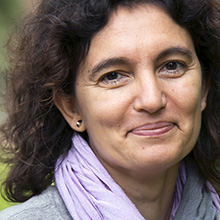URBAN training in COPD
Effectiveness of an intervention of urban training in patients with chronic obstructive pulmonary disease (COPD): a randomised controlled trial

- Duration
- 07/2013 - 03/2016
- Coordinator
- Judith Garcia Aymerich
- Funded by
- FIS-ISCII, SEPAR, SOCAP
- Website
- http://www.entrenament-urba.cat/
Physical activity is a determinant of better prognosis of chronic obstructive pulmonary disease (COPD), but no interventions exist to maintain or achieve appropriate levels of physical activity in COPD patients. This project plans on a training intervention by using public spaces and urban walkable trails, adapted to each patient needs and capabilities.
Objectives:
(1) To assess the effectiveness and cost-effectiveness of an urban training intervention at 12 months follow up in COPD patients in: physical activity levels (primary outcome), and hospital admissions for COPD exacerbation, exercise capacity, body composition, quality of life, and mental health (secondary outcomes);
(2) to identify and classify urban walkable trails for the training of COPD patients; and
(3) to assess cost-effectiveness of the intervention
The Urban Training is a multicentre controlled clinical trial, with stratified randomization according to geographic area 1:1 to intervention (usual care + urban training) or control (usual care), blinded to outcome assessment. COPD patients from five municipalities (Barcelona, Badalona, Mataró, Viladecans and Gavà) were invited to participate.
The intervention was based on a recommendation to walk a minimum of 5 days per week in urban trails appropriate for the patient; and encouragement to stay active through a combination of active (periodic meetings at the trails sites) and passive (text messages to patients’ cell phones, accessibility to a phone number, and use of a website) follow-up.
We designed and validated 104 urban trails (of low, moderate and high intensity) in 34 public spaces (boulevard, beach or park) in 5 municipalities of the Barcelona area. We recruited 411 COPD patients who were randomly assigned to usual care or Urban Training. All of participants completed all tests and questionnaires of the baseline visit. A total of 229 patients have participated in the 12–months follow-up, 73 have been lost to follow-up and 110 are scheduled for the next few months.
Total funding:
164,126 €
Our Team
Coordinator
-
 Judith Garcia Aymerich Research Professor and Head of the Environment and Health over the Lifecourse Programme
Judith Garcia Aymerich Research Professor and Head of the Environment and Health over the Lifecourse Programme
ISGlobal team
-
ANNA DELGADO Research Technician
Other projects
ENDOMIX
Understanding how endocrine disruptors and chemical mixtures of concern target the immune system to trigger or perpetuate disease
AM-MENTAL
What happens with your mental health when your supervisor is an algorithm?
PANAMA
Inhaled dose of air pollution - an integrative approach towards personalized air pollution exposure assessment in participants with and without respiratory diseases
e-QuoL
e-health tools to promote Equality in Quality of Life for childhood to young adulthood cancer patients, survivors and their families
B-Triage
Una prueba en el punto de atención para la estratificación del riesgo de los pacientes febriles basada en los niveles de sTREM-1
El microbioma intestinal y la disrupción circadiana
Un estudio epidemiológico molecular sobre enfermedades cardiometabólicas y salud mental
IHEN
International Human Exposome Network
EXPONIT
Analysing and studying how night shift work affects workers' circadian rhythms and health




